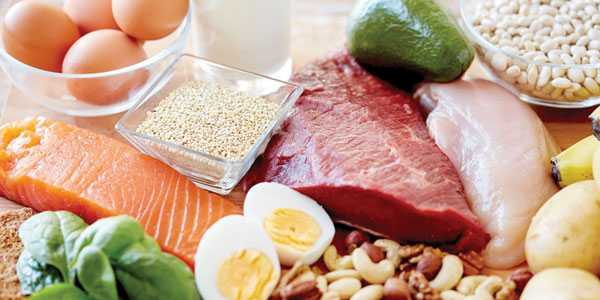
Proteins:
The natural sources of protein are meats: This includes beef, pork, fish, poultry, tofu, eggs, and cheese. Proteins are built from large molecules that are made up of smaller molecules called amino acids. There are non-essential amino acids that the human body can get from fat or carbohydrates in the diet and there are essential amino acids that must be consumed from the animal tissues that can synthesize these amino acids from vegetables.
There are some grains that contain a high percentage of proteins such as quinoa and soy, but in general, they lack essential amino acids.
It is recommended a daily amount of 0.8 g/kg of protein for a healthy body weight. For example, a person who has an ideal weight of 70 kg (154 pounds) should eat at least 123 g (half a pound) of protein per day. Or up to 35% of calories from proteins.
Proteins are very important in a diet because they help repair the tissues or organs and the immune system (the defenses). For some people, eating too much protein can cause some gastrointestinal problems. But in exception of people suffering from gout or certain liver or kidney diseases, there are no really harmful effects.
Since proteins have a low glycemic index, it promotes satiety. Animal proteins are considered high quality because they provide the essential nutrients and vitamins that are not present in vegetables such as the vitamin B complex that is necessary for brain health.
Consejos sobre cómo leer e interpretar etiquetas de alimentos: Parte 7
Proteínas:
Las fuentes naturales de proteína son las carnes: incluyendo res, cerdo, pescado, aves, tofu, huevos y queso. Las proteínas son moléculas grandes que están formadas por moléculas más pequeñas llamadas aminoácidos. Hay aminoácidos no esenciales que el cuerpo humano puede formar a partir de la grasa o de los carbohidratos en la dieta y hay aminoácidos esenciales que el cuerpo humano no puede formar a partir de grasa o carbohidratos y por lo tanto deben ser consumidos a través del consumo de tejidos de animales que si pueden sintetizar estos aminoácidos a partir de los vegetales.
Hay algunos granos que contienen un alto porcentaje de proteínas como la quinoa y la soya pero en general carecen de aminoácidos esenciales.
Se recomienda que la cantidad diaria de proteína sea de 0,8 g / kg de peso corporal saludable. Por ejemplo una persona que tiene un peso ideal de 70 kg (154 libras) debe comer por lo menos 123 g (media libra) de proteína al día. O hasta un 35% de las calorías como proteínas.
Las proteínas son muy importantes en una dieta ya que ayudan a reparar los tejidos u órganos y el sistema inmunológico (las defensas). En general, comer demasiada proteína puede causar algunos problemas gastrointestinales en algunas personas, pero no hay efectos realmente nocivos, excepto en caso de personas que sufren de gota o ciertas enfermedades de hígado o riñón.
La proteína promueve saciedad ya que las proteínas tienen un índice glucémico bajo. Las proteínas animales son consideradas de alta calidad, ya que proporcionan los nutrientes esenciales y vitaminas que no están presentes en los vegetales como el complejo vitamínico B que es necesario para la salud del cerebro.
Dr. Myriam Ensling Internal Medicine and Obesity
5401 College Blvd. Suite 204
Leawood, KS 66211
(913) 317-5040 – (913) 317-5044
enslingmedicine@gmail.com
Escúchame el 1er lunes de cada mes en La Grande 1340 am, a las 1:30pm.










